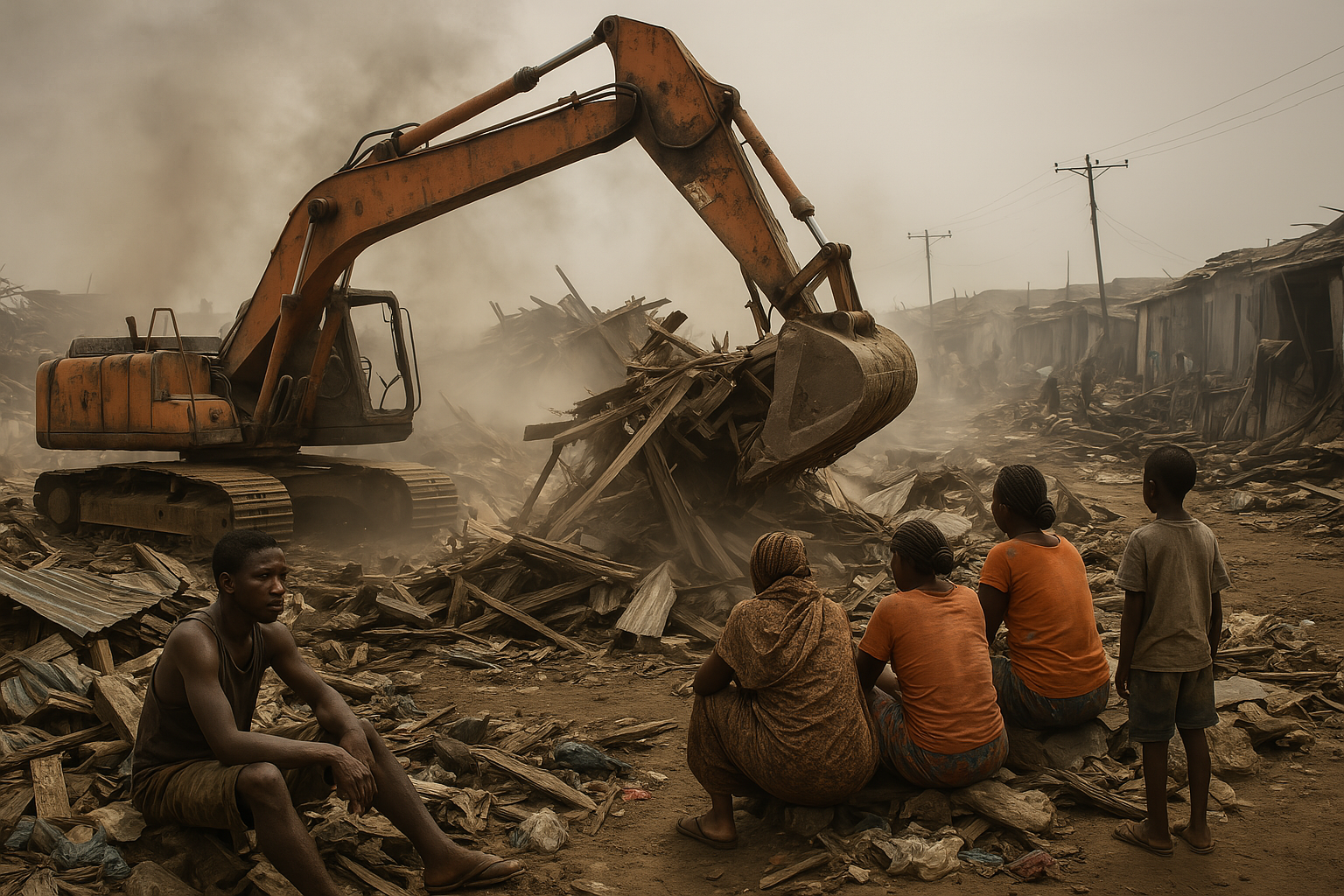Nigeria: Brutal Lagos Evictions Leave 10,000 Homeless Amid Global Outcry
Residents of Ilaje-Otumara and Baba Ijora, many of whom already live in extreme poverty, were reportedly given no prior notice or opportunity to relocate.

Over 10,000 residents of waterfront communities in Lagos, Nigeria, were left homeless following a series of brutal forced evictions and home demolitions carried out by authorities on 7 March 2025. According to independent United Nations human rights experts, the demolitions—targeting impoverished settlements in Ilaje-Otumara and Baba Ijora—represent a grave violation of international human rights law and may amount to domicide, or the deliberate destruction of people's homes, which is a punishable offense under both national and international legal frameworks.
The experts issued a strongly worded statement demanding that the Nigerian government “immediately halt its ruthless campaign of home demolitions and forced evictions in Lagos waterfront settlements.” They stressed that evictions must never result in homelessness, emphasizing that those displaced have a right to adequate alternative housing, resettlement, and compensation for destroyed property.
Violence, Displacement, and Destruction
Residents of Ilaje-Otumara and Baba Ijora, many of whom already live in extreme poverty, were reportedly given no prior notice or opportunity to relocate. The demolitions were conducted under the protection of heavily armed security personnel accompanied by unidentified men wielding machetes, clubs, axes, and guns. The operation involved bulldozers, an excavator, and a notorious Kick Against Indiscipline (KAI) “Black Maria” mobile detention vehicle, all used to raze homes, businesses, churches, mosques, markets, and fishing areas.
Eyewitnesses described scenes of chaos and terror as families scrambled to flee the area, many unable to salvage their belongings. “Some families couldn’t even find their children in the chaos,” said one resident. “We were beaten, and our homes were crushed right in front of us.”
Thousands are now sleeping on streets, under bridges, or in makeshift shelters. The destruction of fishing docks, markets, and small businesses has also resulted in severe food insecurity and a sudden loss of livelihood for the affected communities.
Systematic Evictions and Real Estate Interests
UN human rights experts say the evictions in Lagos are not isolated incidents, but part of a growing and systematic pattern of displacing poor urban communities under the guise of urban renewal and “slum upgrading.” The experts accuse the government of facilitating the takeover of waterfront land for luxury housing developments that primarily benefit private investors, not the displaced citizens.
“These evictions are almost always framed as development projects, but in reality, they consistently disempower vulnerable Nigerians while enriching real estate interests,” the experts said.
Since mid-2023, multiple waterfront communities have suffered similar fates, including Ayetoro and Oko Baba. This wave of evictions follows an earlier crackdown in 2017, when over 30,000 people were forcibly removed from their homes in Otodo-Gbame. That action prompted a Lagos State High Court ruling that barred the government from carrying out further evictions in the area without adequate resettlement plans.
Despite this ruling, demolitions have resumed with increasing frequency. The experts noted that “mass demolitions of poor waterfront communities, which are considered prime sites for luxury housing development, have become systematic in Lagos.”
Legal and Humanitarian Violations
The experts condemned the Lagos State government for violating both domestic and international laws. “Forced evictions, arbitrary demolitions, and forced displacement are contrary to international human rights law and humanitarian law,” they said. “When done on such a large scale and without due process, they may amount to domicide, for which those responsible should be held criminally and civilly liable.”
They added that international engagement is urgently needed to provide emergency assistance to displaced families and prevent further evictions. The experts also criticized the Nigerian government for failing to consult with communities or provide adequate notice, temporary shelter, or compensation.
“No development project should come at the cost of human suffering, displacement, and long-term poverty,” they warned. “The people of Lagos deserve inclusive development policies that protect the rights and dignity of all, especially the most vulnerable.”
Global and Domestic Reactions
The demolitions have sparked outrage both within Nigeria and internationally. Human rights organizations, civil society groups, and local activists have called for immediate intervention and support for the affected communities. Many are urging the international community to apply diplomatic pressure on Nigerian authorities to enforce existing court rulings and halt all future evictions unless humane and lawful procedures are followed.
UN experts confirmed they have been in communication with the Nigerian government regarding the forced evictions and are monitoring the situation closely.
As of now, the displaced residents of Ilaje-Otumara and Baba Ijora continue to live in limbo, struggling to survive without homes, food, or access to basic services—reminders of the human cost of unchecked urban development.
Would you like this turned into a press release, an advocacy brief, or adapted for social media as well?
- READ MORE ON:
- Nigeria










